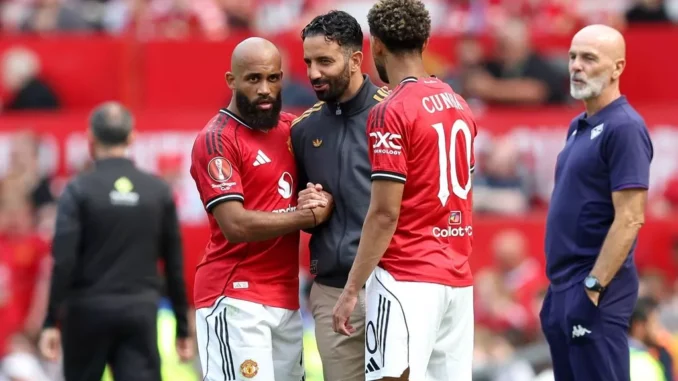
Manchester United are creeping up the Premier League table thanks to three consecutive wins and their summer signings are starting to find their feet
Manchester United’s summer recruits were on full display in their victory against Brighton. Ruben Amorim’s side have now won three Premier League matches in a row.
United seem to have turned a new leaf after a dismal start to the season and buoyed by goals from new signings they conquered Brighton 4-2 last time out. Senne Lammens looked composed in goal as Matheus Cunha opened the scoring and Bryan Mbeumo added a second-half double.
Winger Mbeumo arrived at Old Trafford for an initial £65million after bagging 20 top-flight goals for Brentford last year and he looks a shrewd signing. However, Amorim is set to be without the Cameroonian for a minimum of two matches.
Mirror Football brings you the latest updates from Old Trafford, including a look back at head coach Amorim’s ruthless first transfer window and Rio Ferdinand’s claim about an ex-United striker.
Bryan Mbeumo set for absence
Mbeumo is increasingly proving a pivotal part of Amorim’s attack as he operates to the right of a central striker adjacent to fellow newcomer Cunha.
He has already bagged four league goals and is looking even more prolific as he settles in Manchester, but soon he will leave the club behind to represent his country at the Africa Cup of Nations.
Cameroon have qualified for the international tournament that takes place from late December in Morocco. Mbeumo’s national side begin their group stage campaign on December 24.
With this stage lasting until December 31, Mbeumo will miss at least United’s clashes with Newcastle and Wolves. Should Cameroon advance further, with the final taking place on January 18, he could be absent for at least three more matches, including the Manchester derby on January 17.
Ruben Amorim axed attacking duo
It has been almost a year since head coach Amorim took over at Old Trafford and when he arrived, it became apparent that some of his forward options were not suited to his system.
Marcus Rashford had been underperforming for Erik ten Hag and as the Dutch manager was relieved of his duties, Amorim did not see the English forward fit for his starting XI.
In January, he was shipped out on loan to Aston Villa and is now starring for Barcelona, with any bridges back to Manchester essentially burned. Antony was another who was almost instantly axed by Amorim.
The Brazilian cost a whopping £86m when he was bought from Ajax for Ten Hag and Amorim did not like what he saw when he arrived last November. He was also loaned out to Real Betis and left on a permanent deal this summer.
Rio Ferdinand makes Danny Welbeck claim
Against Brighton, it was a brilliant free-kick from former United striker Danny Welbeck that started off a short-lived resurgence and made it 3-1 in the second half. A Charalampos Kostoulas goal in added time made it 3-2 before Mbeumo settled the nerves with a clinching finish.
The Englishman was a United youth prospect and played consistently after rising through the ranks before he was sold to Arsenal in 2014. His former team-mate Rio Ferdinand believes that currently, he is the second-best Three Lions striker behind captain Harry Kane.
“He’s second to Harry Kane. No, seriously. No experience can do different types of things on the pitch for you,” said Ferdinand on his Rio Ferdinand Presents YouTube channel.
“He can run behind if need be. Like we saw even at Old Trafford at the weekend, he can run behind. He can come short and link play as well as anybody outside of Harry Kane. Like he’s an all-round footballer.”
Leave a Reply